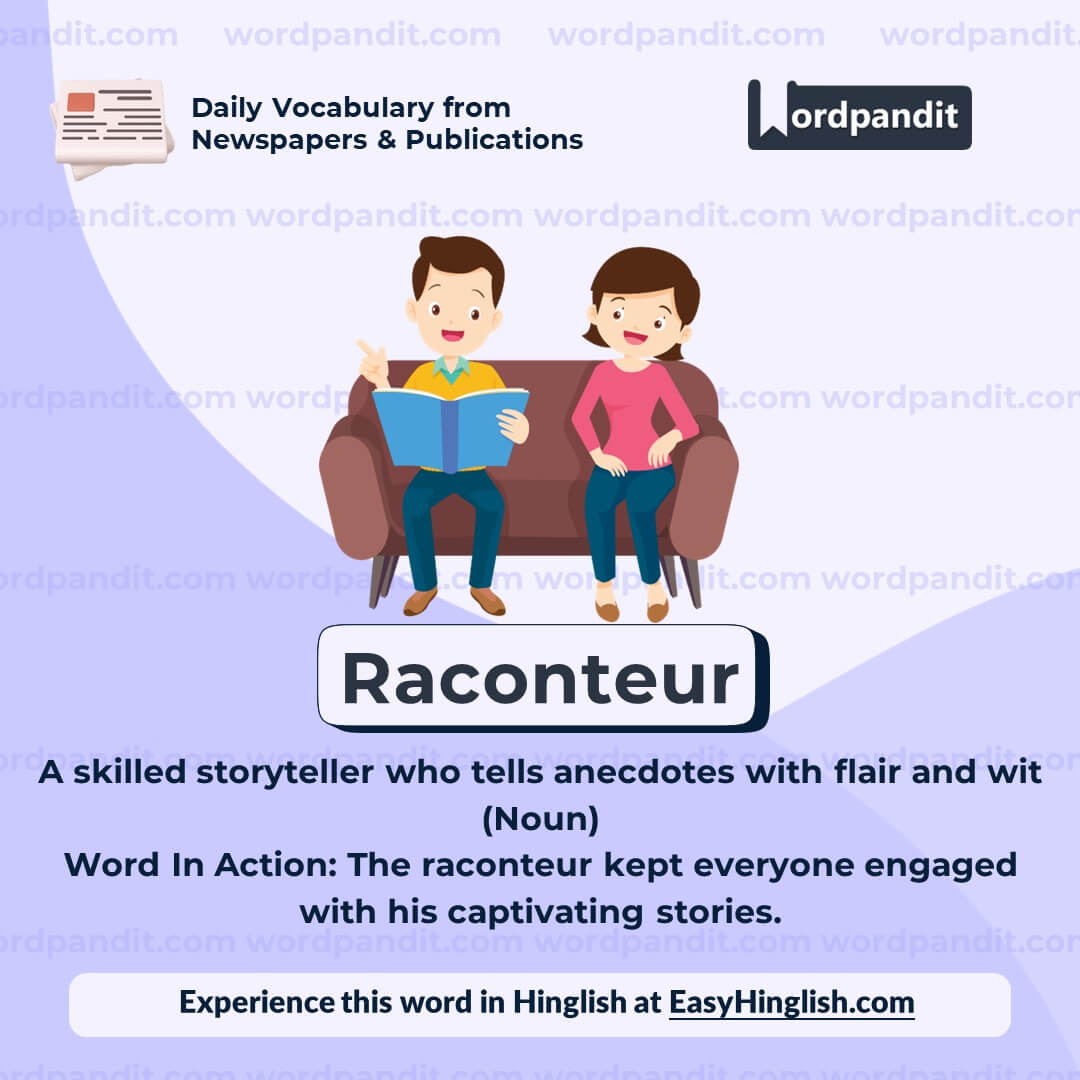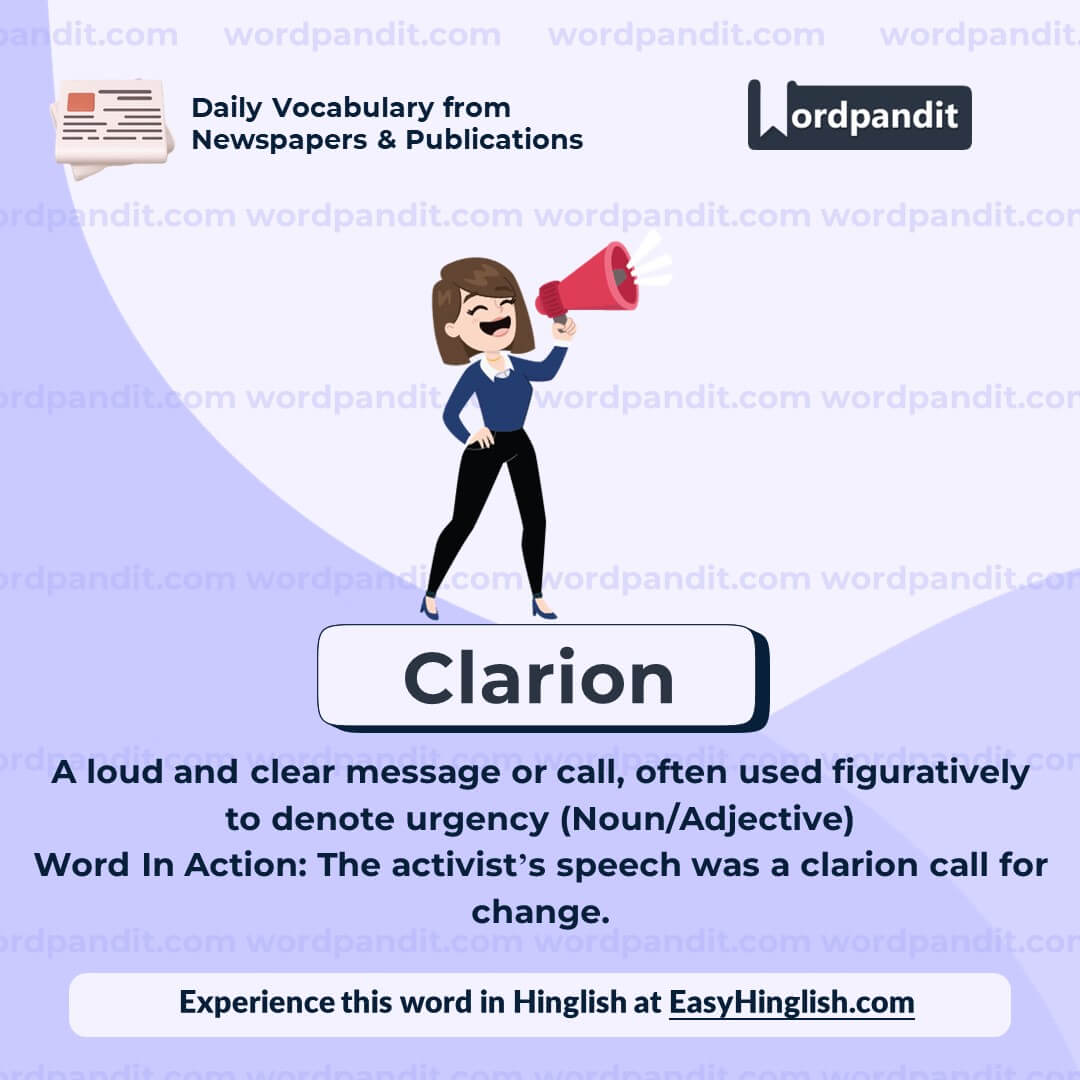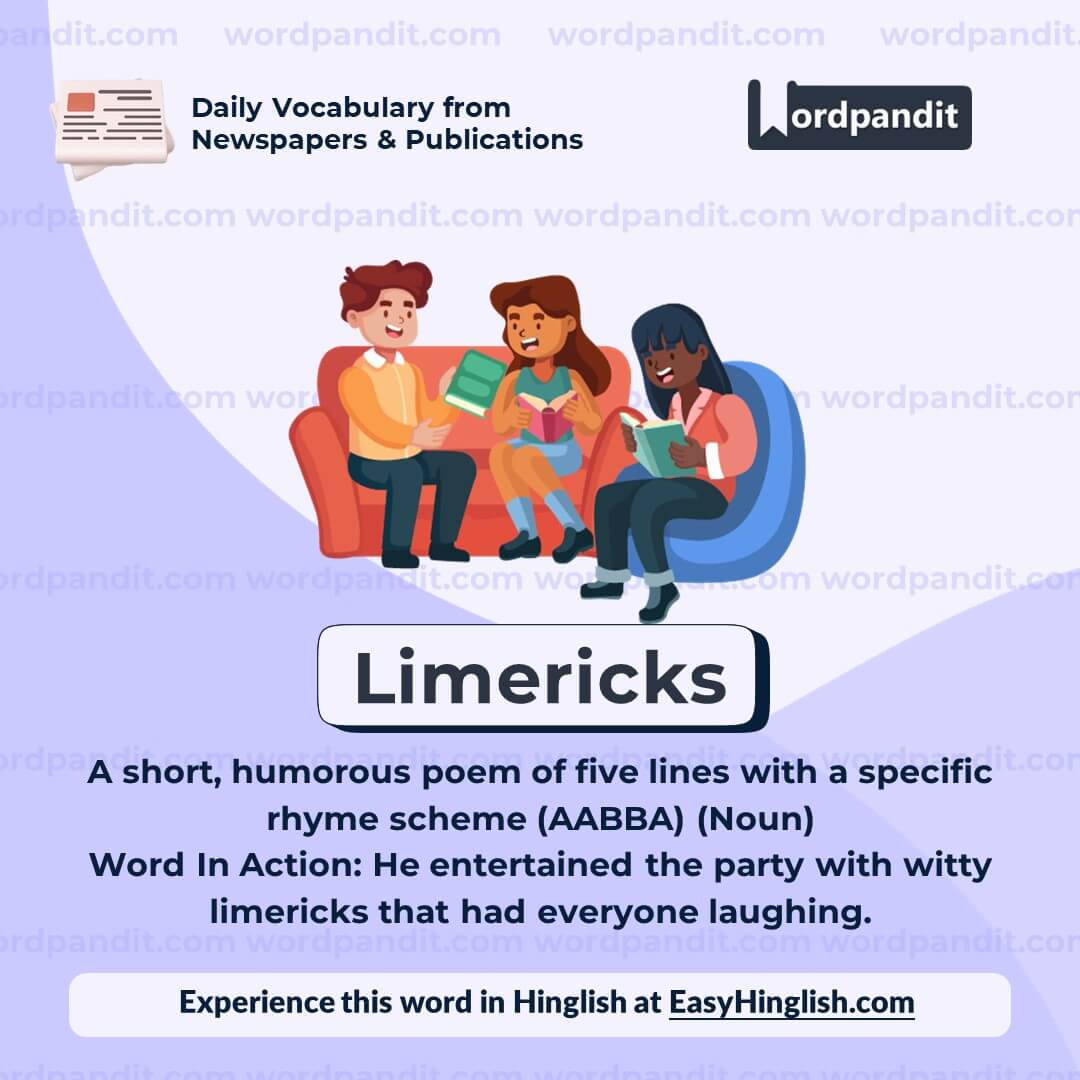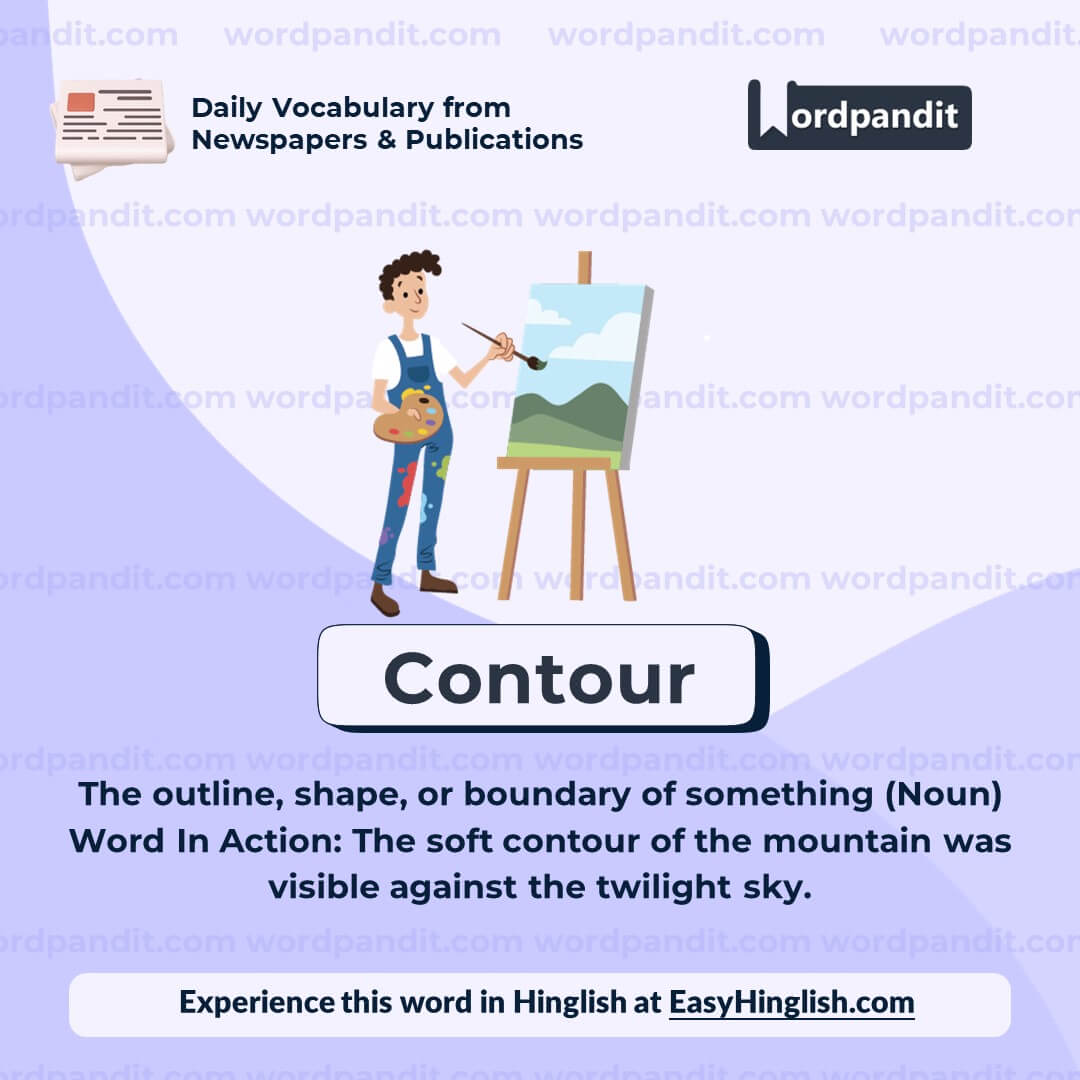Daily Vocabulary from International Newspapers and Publications
Expand Your Vocabulary with Wordpandit’s Global Vocabulary Hub
At Wordpandit, we are committed to helping you develop a truly global vocabulary by drawing from some of the most respected international publications. This section is designed to keep you ahead of the curve by introducing you to words that define global conversations and trends.
The Power of Global Sources
To help you think and communicate on a global scale, we curate vocabulary from renowned international sources, such as:
- The New York Times
- The Washington Post
- BBC
- The Guardian
- The Economist
- Scientific American
- Psychology Today
- And many more...
Stay Global, Stay Competitive
Our daily updates from international publications ensure you are consistently exposed to new words that reflect global news and developments, making sure your vocabulary is not only current but also globally relevant.
Enhance Your Global Perspective
Whether you’re preparing for international exams, aiming to excel in global business communication, or want to enhance your language skills for personal growth, Wordpandit offers the resources you need to thrive in a global context.
Effective Learning, Global Reach
Our learning methodology combines global examples, memory aids, and interactive activities, allowing you to internalize new words effectively and apply them in real-world scenarios.
Begin Your Global Vocabulary Journey Now!
Why Choose Wordpandit?
Practical Learning: Focus on words you'll actually encounter in real-world reading, enhancing your comprehension and communication skills.
Diverse Content: From current affairs to scientific breakthroughs, our varied sources expose you to vocabulary across multiple domains.
Effortless Integration: Make Wordpandit a part of your daily routine. Just a few minutes each day can significantly boost your lexicon over time.
Your Path to Vocabulary Mastery
- Visit our Daily Vocabulary section regularly
- Explore new words and their usage in context
- Practice incorporating these words into your own writing and speech
- Track your progress as your vocabulary expands
Start Your Journey Today
Embark on your vocabulary enhancement journey with Wordpandit. By consistently engaging with our daily posts, you'll build a robust vocabulary that serves you well in academic, professional, and personal contexts.
Remember, a word a day keeps linguistic limitations at bay. Make Wordpandit your daily companion in the quest for vocabulary excellence!
WORD-1: Raconteur
Context:
"The late Daniel C Dennett (1942-2024) was a man of many parts. Sailor, sculptor, singer, pianist, raconteur, aficionado of ribald limericks, much-loved mentor to many young (and not so young) academics, trenchant critic of religion, and the prime mover behind The Philosophical Lexicon (9th ed, 2008)." - Aeon
Explanatory Paragraph:
The word "raconteur" refers to a person who excels at telling stories in an engaging and entertaining way. A raconteur is someone who can effortlessly capture the attention of an audience through their wit, humor, and narrative skill. This term is often used to describe someone who is charming and has a natural gift for storytelling in both social and professional settings.
Meaning: A skilled storyteller who tells anecdotes with flair and wit. (Noun)
Pronunciation: rak-ON-tur
Difficulty Level: ⭐⭐⭐ Intermediate
Etymology: From French "raconteur," derived from the verb "raconter," meaning "to recount" or "to tell."
Synonyms & Antonyms:
Synonyms: Storyteller, narrator, anecdotalist, yarn-spinner
Antonyms: Listener, audience member, mute
Usage Examples:
- The famous raconteur kept the dinner party entertained with tales of his travels across the globe.
- Her reputation as a raconteur grew as she told hilarious and insightful stories about her childhood.
- The author's success was partly due to his talent as a raconteur, as his speeches left audiences spellbound.
- At family gatherings, Uncle George always took on the role of raconteur, regaling everyone with tales from the past.
Cultural Reference:
"Mark Twain, one of America's greatest writers, was also renowned as a raconteur, captivating audiences with his humorous and poignant anecdotes about life on the Mississippi." - Historical Literature
Think About It:
Why do you think storytelling is such an effective way to communicate ideas and emotions, and how can being a raconteur benefit people in different professions?
Quick Activity:
Think of a funny or interesting incident from your life. Write a short story about it, and try to use humor or vivid descriptions to make it engaging. Share it with a friend and observe their reaction!
Memory Tip:
Remember "raconteur" by associating it with "recount." A raconteur is someone who recounts stories with flair and wit.
Real-World Application:
The ability to be a raconteur is invaluable in many professions, such as marketing, teaching, public speaking, and writing, where the art of storytelling helps to connect with audiences, convey messages effectively, and leave a lasting impression.
WORD-2: Clarion
Context:
"Scott’s works served as a clarion call for a radically different approach." - Aeon
Explanatory Paragraph:
The word "clarion" refers to something that is clear, loud, and ringing, often used metaphorically to describe a strong and unmistakable message or call to action. Historically, it referred to a medieval trumpet with a sharp and piercing sound, but today it is commonly used in a figurative sense to emphasize urgency and clarity in communication.
Meaning: A loud and clear message or call, often used figuratively to denote urgency. (Noun/Adjective)
Pronunciation: KLAIR-ee-uhn
Difficulty Level: ⭐⭐⭐ Intermediate
Etymology: From Middle English "clarioun," derived from Old French "clarion," meaning "trumpet," which in turn came from Latin "clarus," meaning "clear."
Synonyms & Antonyms:
Synonyms: Trumpet call, proclamation, rallying cry, announcement
Antonyms: Whisper, murmur, silence, hush
Usage Examples:
- The environmental activist's speech was a clarion call for immediate action to combat climate change.
- The president's clarion message of unity resonated deeply with the divided nation.
- Her article served as a clarion warning about the consequences of unchecked technological growth.
- The clarion notes of the trumpet signaled the start of the royal procession.
Cultural Reference:
"Winston Churchill’s speeches during World War II were often described as clarion calls, rallying the British people to resist and persevere against adversity." - Historical Archives
Think About It:
What kinds of events or moments in history have served as clarion calls for social, political, or cultural change, and why were they so impactful?
Quick Activity:
Think of an issue or cause you are passionate about. Write a short "clarion call" message encouraging people to take action and share it with others.
Memory Tip:
Remember "clarion" by linking it to "clarity" and "clear sound." A clarion call is like a trumpet’s sound—loud, clear, and impossible to ignore.
Real-World Application:
The concept of a "clarion call" is widely applicable in speeches, marketing campaigns, and social movements, where delivering a powerful and unmistakable message is key to inspiring action or change.
WORD-3: Limericks
Context:
"The late Daniel C Dennett (1942-2024) was a man of many parts. Sailor, sculptor, singer, pianist, raconteur, aficionado of ribald limericks, much-loved mentor to many young (and not so young) academics, trenchant critic of religion, and the prime mover behind The Philosophical Lexicon (9th ed, 2008)." - Aeon
Explanatory Paragraph:
Limericks are short, humorous, and often whimsical poems consisting of five lines with a specific rhyme scheme (AABBA). These lighthearted poems are known for their playful tone and rhythm. Limericks frequently include clever wordplay, puns, or ribald humor, making them a popular form of entertainment in both formal and informal settings. They are easy to compose and are often recited to amuse others.
Meaning: A short, humorous poem of five lines with a specific rhyme scheme (AABBA). (Noun)
Pronunciation: LIM-er-iks
Difficulty Level: ⭐⭐⭐ Beginner to Intermediate
Etymology: Likely derived from the Irish city of Limerick, where this form of poetry may have gained popularity in the 18th century. The exact origin of the name remains uncertain.
Synonyms & Antonyms:
Synonyms: Verse, rhyme, quatrain (though not identical in form)
Antonyms: Prose, essay, free verse
Usage Examples:
- The poet entertained the audience with a series of limericks that had everyone laughing.
- Children often enjoy learning limericks because of their playful rhythm and rhyme.
- He wrote a clever limerick about his travels, which he shared with his friends over dinner.
- The book included a collection of ribald limericks that showcased the poet's wit.
Cultural Reference:
"Edward Lear, a 19th-century English poet, is often credited with popularizing limericks through his 'Book of Nonsense,' a collection of humorous poems." - Literary History
Think About It:
Why do you think the structured form and rhyme of limericks make them so engaging and memorable for readers and listeners?
Quick Activity:
Write your own limerick! Use the rhyme scheme AABBA and try to make it funny or clever. For example: "There once was a cat from Peru / Who loved to eat chocolate fondue / It dipped every paw / Till it broke the law / And now it's in chocolate jail too!"
Memory Tip:
Remember "limericks" by thinking of the word "limit"—they’re short poems with limited lines (five) and a specific rhyme scheme.
Real-World Application:
Limericks can be used in educational settings to teach rhyme and rhythm, as icebreakers in workshops, or even in marketing to create catchy and memorable jingles. Their humorous nature makes them versatile and enjoyable in various contexts.
WORD-4: Trenchant
Context:
"The late Daniel C Dennett (1942-2024) was a man of many parts. Sailor, sculptor, singer, pianist, raconteur, aficionado of ribald limericks, much-loved mentor to many young (and not so young) academics, trenchant critic of religion, and the prime mover behind The Philosophical Lexicon (9th ed, 2008)." - Aeon
Explanatory Paragraph:
The word "trenchant" describes something that is sharp, incisive, and powerfully effective, often in the context of communication or criticism. A trenchant remark or observation is one that cuts straight to the core of an issue, demonstrating clarity, insight, and forcefulness. This word is frequently used to describe criticism or analysis that is both compelling and thought-provoking.
Meaning: Sharp, incisive, and forceful; effective and impactful. (Adjective)
Pronunciation: TREN-chunt
Difficulty Level: ⭐⭐⭐ Intermediate
Etymology: From Old French "trenchant," meaning "cutting" or "sharp," derived from "trencher," meaning "to cut."
Synonyms & Antonyms:
Synonyms: Incisive, sharp, penetrating, forceful, cutting
Antonyms: Vague, weak, ambiguous, mild
Usage Examples:
- The journalist’s trenchant analysis of the political scandal left no room for doubt about the corruption involved.
- Her trenchant remarks during the meeting highlighted the inefficiencies in the current system.
- The professor’s trenchant critique of the theory challenged the students to think more deeply about its implications.
- The book is filled with trenchant observations about society and human behavior.
Cultural Reference:
"George Orwell’s essays are celebrated for their trenchant social and political criticism, offering profound insights into the issues of his time." - Literary Archives
Think About It:
Why do you think trenchant criticism is so effective in bringing attention to important issues? Can it ever be counterproductive?
Quick Activity:
Choose a topic you’re passionate about and write a short, trenchant critique of it. Focus on being clear, direct, and impactful in your observations.
Memory Tip:
Think of "trenchant" as a "trench" dug into an issue—sharp, deep, and impactful. It leaves no room for superficiality.
Real-World Application:
The ability to deliver trenchant commentary is invaluable in professions like journalism, academia, and law, where clear and impactful communication can influence opinions, policies, and decisions. However, it is equally important to balance trenchant criticism with tact and constructive suggestions.
WORD-5: Contour
Context:
"The years BD (‘before Dennett’), philosophers assumed that their job was to chart the contours of our ordinary thought and talk about the mind." - Aeon
Explanatory Paragraph:
The word "contour" refers to the shape, outline, or boundaries of something, often used to describe physical forms, landscapes, or figurative ideas such as concepts or thought patterns. In a literal sense, it is associated with the edges or curves of a surface, while figuratively, it can refer to the structure or framework of an abstract idea or phenomenon.
Meaning: The outline, shape, or boundary of something. (Noun)
Pronunciation: KON-toor
Difficulty Level: ⭐⭐⭐ Beginner to Intermediate
Etymology: From French "contour," meaning "outline," derived from Latin "contornare," which combines "con-" (together) and "tornare" (to turn).
Synonyms & Antonyms:
Synonyms: Outline, shape, profile, framework, configuration
Antonyms: Core, center, interior, substance
Usage Examples:
- The artist skillfully traced the contours of the model’s face with a pencil.
- The road followed the natural contours of the mountain, winding up and down.
- The historian mapped out the contours of political thought in the 20th century.
- The makeup artist used highlighters to accentuate the contours of her cheekbones.
Cultural Reference:
"In geography, contour maps are used to represent the elevation and shape of the terrain. These maps have been essential tools for hikers, urban planners, and environmental scientists for decades." - Cartography Essentials
Think About It:
How do the physical contours of a landscape influence the way people interact with it, and how can understanding the contours of an idea help us navigate complex problems?
Quick Activity:
Draw a simple contour map of a nearby area, such as a park or hill. Alternatively, write a paragraph outlining the "contours" of a recent discussion or debate you were part of, focusing on the key points and ideas.
Memory Tip:
Think of "contour" as a combination of "con-" (together) and "tour" (a journey)—it represents the shape or journey around the edges of something.
Real-World Application:
The concept of "contours" is applicable in various fields such as art, geography, architecture, and abstract thinking. In art and design, understanding contours helps create visually appealing work, while in problem-solving, identifying the contours of an issue aids in constructing effective solutions.


















